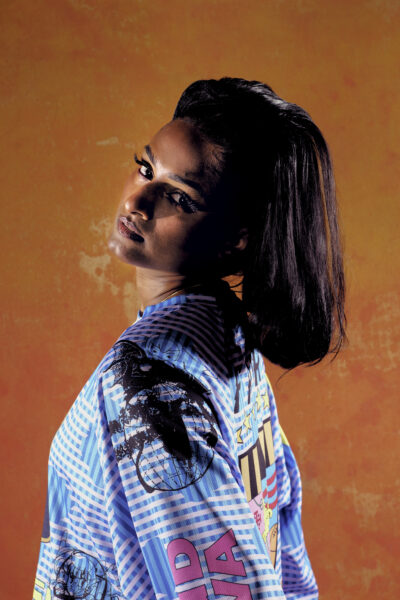Few artists coin their very own genre with the release of their debut record. But Priya Ragu is not like most artists. She describes her music as Raguwavy, a mixture of soul, RnB, pop, and influences from traditional and Kollywood and Tamil rhythms. The artist kickstarted her career in music with her 2021 debut damnshestamil and returned this year with SANTHOSAM. I call the singer shortly after its release. Priya connects via Zoom from London, where she performed the songs live for the first time. That was when she realized that “oh shit, the album is really out now”. In our conversation, we go back to Priya’s beginnings in music, the family ties that shaped the record, and ultimately self-empowerment through creative expression.
Looking Back

Album Cover “SANTHOSAM”
“The cover represents me looking back to my parents’ birthplace in Jaffna, Sri Lanka,” Priya Ragu explains when I ask about the colorful cover. It shows a drawing of the singer from behind, looking at a neighborhood of golden temples and broken houses with pink skies over them. The destruction in the image echoes the horrific genocide and expulsion of the Tamil people from their land in the past decades. “You can see all the broken houses, everything is broken down, but the sun is still shining. I am looking back at where I am coming from.” On SANTHOSAM, Priya journeys back to her roots, a journey that is as personal as it is political.
The title is Tamil and translates more or less to ‘happiness’ in English. But as it is so often, the nuance of the word gets lost in translation. Priya comments: “Happiness sounds so blunt. The Santhosam that I am talking about is more like being content in life and knowing that nobody can control your emotions.” The contentment and fulfillment of Santhosam is something that Priya finds in music, expressing herself and connecting with others, and moments spent with loved ones.
Full Circle Moment
 Family plays a key role in Priya Ragu’s music. Growing up in Switzerland, music was a way for her parents to stay connected with and celebrate their Tamil roots. Traditional Tamil music has been around since Priya can remember, and making music together became a family tradition and continues to be. At the age of ten, Priya joined her father’s band as a singer performing traditional Tamil songs, but her parents were opposed to the Western influences that Priya started gravitating towards. She mentions Lauryn Hill as one of the artists that shaped her the most. She also relates to the story of the singer, as her parents did not approve of her making music other than traditional music. Finally, her father even forbade her from performing at a show together with her brother, now known as producer Japhna Gold. Priya then stepped away from music to pursue a career her parents approved of, but the spark kept lingering inside her.
Family plays a key role in Priya Ragu’s music. Growing up in Switzerland, music was a way for her parents to stay connected with and celebrate their Tamil roots. Traditional Tamil music has been around since Priya can remember, and making music together became a family tradition and continues to be. At the age of ten, Priya joined her father’s band as a singer performing traditional Tamil songs, but her parents were opposed to the Western influences that Priya started gravitating towards. She mentions Lauryn Hill as one of the artists that shaped her the most. She also relates to the story of the singer, as her parents did not approve of her making music other than traditional music. Finally, her father even forbade her from performing at a show together with her brother, now known as producer Japhna Gold. Priya then stepped away from music to pursue a career her parents approved of, but the spark kept lingering inside her.
In 2017, Priya Ragu decided to give music one last shot. She spent some time in New York City to focus on her writing. There, she wrote her first song Leaf Deep, which her brother Japhna Gold produced. She describes his influence as bringing out the essence of her music. Up to this day, her brother continues to be her closest collaborator. At first, Priya had to keep this change of plans secret because her family did not condone her pursuing a music career, especially not music with soul and hip-hop influences. But since the release of damnshestamil and the rapid success that came with the debut, her family grew to support her musical ambitions. Now, they even listen to the new record on repeat and Priya says that her father became a collaborator again.
“It is a full circle moment, from my dad making me sing in his band and then he kind of forbade me in the middle of my life from making music. Now, he gives me feedback on songs and even records with me. We found this thing that bonds us again. It is so much more fun to share this with my family. I cannot imagine doing this alone and then having nobody to celebrate this with.”
Higher Powers
The song that the family wrote together that made it on this record is Mani Osai. Priya Ragu says that in the finishing process of the album, the label encouraged her to include a song with a more traditional sound. This is when Mani Osai came to the singer’s mind. “The song is about having a spiritual master in life,” she says. It draws on some of the Tamil producers that inspired the sound of Priya Ragu like Ilaiyaraaja and A.R. Rahman but mostly, it is a family song.
The spirituality that Priya is talking about is something that she got in touch with at a young age when her family went on regular trips to Chennai, India. Today, she describes the experience with a smile on her face: “My parents used to drag us to each and every temple in the morning. I had to wake up at like 3 a.m. and take the bus for hours to get there. I did not like it as a kid. But now, I really appreciate that they took me there. It is part of my journey, of my spiritual journey.” Today, Priya still draws from these experiences and continues to celebrate spirituality. It is incorporated into her sound on songs like Black Goose, which draws on the Tamil traditional sound of Kuthu, her lyricism, and the way she looks at her path as an artist: “When I started making music, everything happened so quickly. I do believe there is a higher power leading me because I also think that we artists are like channels. Creative energy is my source, and I am really grateful for that.”
Liberate Yourself
 Even though Priya Ragu celebrates family on SANTHOSAM, some pressures and pains come with it, too. In the song School Me Like That, the artist calls out and rejects the pressure her family put on her to get married. “I am allergic to that topic”, Priya laughs talking about these societal expectations. Yet marriage is constantly being brought up, for example, by Priya’s grandmother, whose voice opens the album on Ammama’s Note asking the singer when she will get married. “The voice note starts the album and then it goes into ‘School Me Like That’, which is about breaking free from all these societal expectations.”
Even though Priya Ragu celebrates family on SANTHOSAM, some pressures and pains come with it, too. In the song School Me Like That, the artist calls out and rejects the pressure her family put on her to get married. “I am allergic to that topic”, Priya laughs talking about these societal expectations. Yet marriage is constantly being brought up, for example, by Priya’s grandmother, whose voice opens the album on Ammama’s Note asking the singer when she will get married. “The voice note starts the album and then it goes into ‘School Me Like That’, which is about breaking free from all these societal expectations.”
School Me Like That has a powerful and energetic sound incorporating tabla beats and synthesizers. Priya is venting all her frustration about the constant pressure her family and society subject her to. The song is one of the fury-laden anthems of resistance and liberation on SANTHOSAM. The record strikes an impressive balance between easygoing songs about love and living life like Vacation and Easy and heavy songs with a political message. This came naturally to Priya, who describes her music as self-empowerment.
“There was no theme or concept for the album. I just write about whatever comes out of me. There are songs that are nice to sing like ‘Vacation’ and ‘Easy’, but it is songs like ‘Black Goose’ and ‘School Me Like That’ that actually make me feel something. ‘Black Goose’ is inspired by George Floyd and the surge of the Black Lives Matter Movement following his killing by the police. It felt crazy to record that in the booth because there was so much rage and pain inside of me.”
Expressing these emotions through music can be freeing. It also resonates with other people, especially those, who are passionate about the same causes. With Black Goose Priya Ragu was also chosen to perform at Colors, a special experience. She says: “I don’t want to sound too spiritual here, but it was like some kind of higher power. Once we finished the song and I looked around, everybody was in tears, even the director. Everybody felt it at that moment. That is the power of music.”
All the Emotions
On the record, Black Goose is followed directly by Let Me Breath (Reprise), a song that soothes the speed of the rage of Black Goose and has a healing sound. Together, they represent the transformative power of anger being channeled into art and, finally, healing. These emotions find expression in music, and Priya Ragu also draws on traditional Tamil rhythms as she explains: “You can hear the aggressive rhythm. That is something we hear a lot in relation to our goddess Kali. When she is enraged, that is the kind of music they play. It is called Kuthu. The rhythm is part of the song so that even if you take away the vocals, you still get the message.” The transformation from that rage to the calming Let Me Breathe (Reprise) happens abruptly. Priya Ragu says that they used the effect of a gunshot to make this rupture audible. This also represents the police and gun violence affecting Black, Indigenous, and PoC communities disproportionately because of prevailing racist and white-supremacist structures and hate.
SANTHOSAM is an angry but healing record. It is a political record, a family record, and a connector to her culture. It is a document of Priya Ragu’s family lineage traced back to her grandparents, and a musical projection of the facets that make the artist the person she is. And it is an invitation to dance and to relax. Even though the songs embody different aspects of her journey, they all come together in an album of absolute “self-empowerment”, as Priya puts it.
SANTHOSAM is out now via Warner Records.



